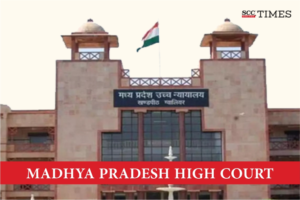Madhya Pradesh High Court: In a petition filed under Section 482 of the Criminal Procedure Code, 1973 (CrPC) seeking quashment of FIR registered for the offence punishable under Sections 376 and 120-B of the Penal Code, 1860 (IPC), a single-judge bench of Sanjay Dwivedi, J., quashed the FIR against the petitioner based on delay in lodging the FIR, combined with the complainant’s history of similar allegations and the petitioner’s credible defense. The Court held that the prosecution against the petitioner appears to be malicious, instituted with ulterior motives, and constitutes an abuse of the legal process.
In the instant matter, the complainant lodged an FIR on 16-02-2022, at 13:52 hours for an incident that allegedly occurred on 30-06-2020, at about 12:00 noon. The complainant stated that she started chatting on WhatsApp with the petitioner and met him on 30-06-2020. The complainant alleged that the petitioner, along with co-accused, took her to a house in CNit Colony where the petitioner committed sexual intercourse on the pretext of marriage. Later, she discovered that the petitioner was already married, and he refused to marry her.
The petitioner argued that there was a significant delay in lodging the FIR and claimed that the complainant is involved in a “honey trap” racket aimed at extorting money from individuals. The petitioner contended that he lodged an FIR against the complainant for demanding Rs. 10 Lakhs in order to not implicate in a false case of rape, blackmailing and extortion, leading to her arrest. The petitioner contended that he provided an affidavit for no objection to bail for the complainant, resulting in her bail, but the complainant is pressurising the petitioner to settle the matter. The petitioner also highlighted the several past instances where the complainant lodged similar complaints against other individuals, suggesting a pattern of false allegations for monetary gain. On the other hand, the respondent although not denied the factual aspects, argued that at this stage, it is improper to quash the FIR based on the petitioner’s claims about the complainant’s past behavior.
The Court noted that the complainant had lodged similar complaints against multiple individuals, suggesting a possible pattern of extortion and malicious prosecution. The Court stated that the complainant in the affidavit stated that she receivied Rs. 3,50,000/- from an accused and later retracted her allegations further cast doubt on her credibility. The Court stated that the FIR was filed almost two years after the incident, which is a significant delay, especially given the complainant’s conduct and lack of explanation for the delay. The Court asserted that while delay in reporting rape is not always material, however, in the present case, it is crucial due to the complainant’s history and the timing of her allegations. The Court further noted that the petitioner registered a complaint against the complainant alleging extortion and harassment prior to the complainant’s FIR, supporting his defense.
The Court referred to State of Haryana v. Bhajanlal, 1992 Supp (1) SCC 335, where the Supreme Court laid down the guidelines for quashing proceedings under extraordinary and inherent powers to prevent abuse of the process of law. The guidelines are as follows —
-
If the allegations in the FIR, taken at face value, do not prima facie constitute any offence or make out a case against the accused.
-
When the allegations in the FIR and accompanying materials do not disclose a cognizable offence, justifying police investigation under Section 156(1) CrPC without an order from a Magistrate under Section 155(2).
-
If the uncontroverted allegations in the FIR and the evidence collected do not disclose the commission of any offence or establish a case against the accused.
-
When the allegations in the FIR do not constitute a cognizable offence but only a non-cognizable offence, no investigation is permissible by a police officer without a Magistrate’s order under Section 155(2) CrPC.
-
If the allegations in the FIR or complaint are so absurd and inherently improbable that no prudent person can reach a just conclusion sufficient to proceed against the accused.
-
Where there is a specific legal bar under the CrPC or the concerned Act preventing the institution or continuation of criminal proceedings, or where there exists an alternative redressal mechanism for the grievance of the aggrieved party.
-
When a criminal proceeding is manifestly attended with mala-fide or is maliciously instituted with an ulterior motive, such as vengeance due to personal grudge against the accused.
The Court cited Deepak Gulati v. State of Haryana, (2013) 7 SCC 675, where the Supreme Court differentiated between consensual sex and rape under false promises of marriage. The Court noted that mere breach of a promise to marry without malafide intention does not amount to rape. The Court referred to Dhruvram Murlidhar Sona v. State of Maharashtra, (2019) 18 SCC 191, where the Supreme Court reiterated that the exercise of power under Section 482 CrPC is an exception and not the rule, intended to prevent abuse of the legal process and to secure justice.
The Court held that the FIR against the petitioner was lodged with mala fide intentions and ulterior motives to extort money. Applying the principles laid down in Bhajan Lal (Supra), the Court exercised its power under Section 482 CrPC and quashed the FIR and all consequential actions and investigations thereto.
[Kuldeep Dubey v. State of M.P., 2024 SCC OnLine MP 4763, order dated 03-07-2024]
*Judgment by Justice Sanjay Dwivedi
Advocates who appeared in this case :
Shri Eshaan Datt, Counsel for the Petitioner
Shri Amit Bhurrak, Panel Lawyer, Counsel for the Respondents


